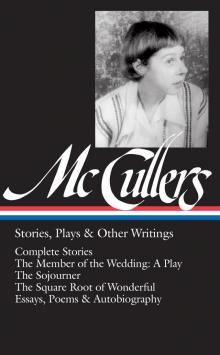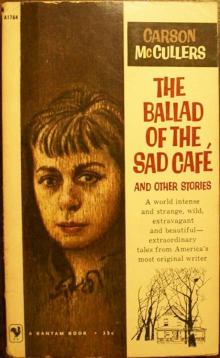- Home
- Carson McCullers
Reflections in a Golden Eye Page 3
Reflections in a Golden Eye Read online
Page 3
For almost two weeks Private Williams reconnoitered in this secret manner around the Captain's quarters. He learned the habits of the household. The servant was usually in bed at ten o'clock. When Mrs. Penderton spent the evening at home, she went upstairs at about eleven and the light in her room was turned off. As a rule the Captain worked from about ten thirty until two o'clock.
Then on the twelfth night the soldier walked through the woods even more slowly than usual. From a far distance he saw that the house was lighted. In the sky there was a white brilliant moon and the night was cold and silvery. The soldier could be plainly seen as he left the woods to cross the lawn. In his right hand was a pocket knife and he had changed his clumsy boots for tennis shoes. From the sitting room there was the sound of voices. The soldier went up to the window.
'Hit me, Morris,' said Leonora Penderton. 'Give me a big number this time.'
Major Langdon and the Captain's wife were playing a game of blackjack. The stakes were worth while and their system of reckoning very simple. If the Major won all the chips on the table, he was to have Firebird for a week if Leonora won them, she would get a bottle of her favorite rye. During the last hour the Major had raked in most of the chips. The firelight reddened his handsome face and he was drumming a military tattoo with the heel of his boot on the floor. His black hair was turning white at the temples; already his clipped mustache was a becoming gray. Tonight he was in uniform. His heavy shoulders were slouched and he seemed warmly contented except when he glanced over at his wife then his light eyes were uneasy and beseeching. Across from him Leonora had a studious, serious air, as she was trying to add fourteen and seven on her fingers underneath the table. At last she put the cards down.
'Am I busted?'
'No, my dear,' said the Major. 'Twenty one exactly. Blackjack.'
Captain Penderton and Mrs. Langdon sat before the hearth. Neither of them was comfortable at all. They were both nervous this evening and had been talking with grim vivacity about gardening. There were good reasons for their nervousness. These days the Major was not altogether the same easy go lucky man he used to be. And even Leonora vaguely felt the general depression. For one reason, a strange and tragic thing had happened among these four people a few months ago. They had been sitting like this late one night when suddenly Mrs. Langdon, who had a high temperature, left the room and ran over to her own house. The Major did not follow her immediately, as he was comfortably stupefied with whiskey. Then later Anacleto, the Langdons' Filipino servant, rushed wailing into the room with such a wild eyed face that they followed him without a word. They found Mrs. Langdon unconscious and she had cut off the tender nipples of her breasts with the garden shears.
'Does anybody want a drink?' the Captain asked.
They were all thirsty, and the Captain went back to the kitchen for another bottle of soda water. His deep uneasiness of mind was caused by the fact that he knew things could not go on much longer as they were. And although the affair between his wife and Major Langdon had been a torment to him, he could not think of any likely change without dread. Indeed his torment had been a rather special one, as he was just as jealous of his wife as he was of her lover. In the last year he had come to feel an emotional regard for the Major that was the nearest thing to love that he had ever known. More than anything else he longed to distinguish himself in the eyes of this man. He carried his cuckoldry with a cynical good grace that was respected on the post. Now as he poured out the Major's drink his hand was shaking.
'You work too hard, Weldon,' Major Langdon said, 'And let me tell you one thing it's not worth it. Your health comes first because where would you be if you lost it? Leonora, do you want another card?'
As Captain Penderton poured Mrs. Langdon's drink, he avoided her eyes. He loathed her so much that he could scarcely bear to look at her. She sat very quiet and stiff before the fire and she was knitting. Her face was deadly pale and her lips were rather swollen and chapped. She had soft, black eyes of feverish brilliance. She was twenty nine years old, two years younger than Leonora. It was said that she once had had a beautiful voice, but no one on this post had ever heard her sing. As the Captain looked at her hands, he felt a quiver of nausea. Her hands were slender to the point of emaciation, with long fragile fingers and delicate branchings of greenish veins from the knuckles to the wrist. They were sickly pale against the crimson wool of the sweater she was knitting. Frequently, in many mean and subtle ways, the Captain tried to hurt this woman. He disliked her first of all because of her total indifference to himself. The Captain despised her also for the fact that she had done him a service she knew, and kept secret, a matter which if gossiped about could cause him the most distressing embarrassment.
'Another sweater for your husband?'
'No,' she said quietly. 'I haven't decided just what I mean to do with this.'
Alison Langdon wanted terribly to cry. She had been thinking of her baby, Catherine, who had died three years before. She knew that she should go home and let her houseboy, Anacleto, help her get to bed. She was in pain and nervous. Even the fact that she did not know for whom she was knitting this sweater was a source of irritation to her. She had taken to knitting only when she had learned about her husband. At first she had done a number of sweaters for him. Then she had knitted a suit for Leonora. During the first months she could not quite believe that he could be so faithless to her. When at last she had scornfully given up her husband, she had turned desperately to Leonora. There began one of those peculiar friendships between the wife who has been betrayed and the object of her husband's love. This morbid, emotional attachment, bastard of shock and jealousy, she knew was unworthy of her. Of its own accord it had soon ended. Now she felt the tears come to her eyes and she drank a little whiskey to brace herself, although liquor was forbidden her because of her heart She herself did not even like the taste of it. She much preferred a tiny glass of some syrupy liqueur, or a little sherry, or even a cup of coffee if it came to that. But now she drank the whiskey because it was there, and the others were drinking, and there was nothing else to do.
'Weldon!' called out the Major suddenly, 'your wife is cheating! She peeked under the card to find if she wanted it.'
'No, I didn't. You caught me before I had a chance to see it. What have you got there?'
'I'm surprised at you, Moms,' said Captain Penderton. 'Don't you know you can never trust a woman at cards?'
Mrs. Langdon watched this friendly badinage with an on the defensive expression that is often seen in the eyes of persons who have been ill for a long time and dependent upon the thoughtfulness, or negligence, of others. Since the night she had rushed home and hurt herself, she had felt in her a constant, nauseous shame. She was sure that everyone who looked at her must be thinking of what she had done. But as a matter of fact the scandal had been kept quite secret; besides those in the room only the doctor and the nurse knew what had happened and the young Filipino servant who had been with Mrs. Langdon since he was seventeen years old and who adored her. Now she stopped knitting and put the tips of her fingers to her cheekbones. She knew that she should get up and leave the room, and break with her husband altogether. But lately she had been overcome by a terrible helplessness. And where on earth would she go? When she tried to think ahead, weird fancies crept into her mind and she was beset by a number of nervous compulsions. It had come to the point where she feared her own self as much as she feared others. And all the time, unable to break away, she had the feeling that some great disaster was in wait for her.
'What's the matter, Alison?' Leonora asked. 'Are you hungry? There's some sliced chicken in the icebox.' For the past few months Leonora often addressed Mrs. Langdon in a curious manner. She worked her mouth exaggeratedly to form the words and spoke in the careful and reasonable voice that one would use when addressing an abject idiot. 'Both white meat and dark. Very good. Mmmmh?'
'No, thank you.'
'Are you sure, darling?' the Major asked. 'You don't want an
ything?'
'I'm quite all right. But would you mind ? Don't tap your heel like that on the floor. It bothers me.'
'I beg your pardon.'
The Major took his legs from under the table and crossed them sideways in his chair. On the surface the Major naively believed that his wife knew nothing about his affair. However, this soothing thought had become increasingly more difficult for him to hold on to; the strain of not realizing the truth had given him hemorrhoids and had almost upset his good digestion. He tried, and succeeded, in looking on her obvious unhappiness as something morbid and female, altogether outside his control. He remembered an incident that had happened soon after they were married. He had taken Alison out quail shooting and, although she had done target practice, she had never been hunting before. They had flushed a covey and he remembered still the pattern of the flying birds against the winter sunset. As he was watching Alison, he had only brought down one quail, and that one he insisted gallantly was hers. But when she took the bird from the dog's mouth, her face had changed. The bird was still living, so he brained it carelessly and then gave it back to her. She held the little warm, ruffled body that had somehow become degraded in its fall, and looked into the dead little glassy black eyes. Then she had burst into tears. That was the sort of thing the Major meant by 'female' and 'morbid'; and it did a man no good to try to figure it all out. Also, when the Major was troubled about his wife these days he thought instinctively, as a means of self defense, of a certain Lieutenant Weincheck, who was a company commander in the Major's own battalion and a close friend of Alison's. So now as her face troubled his conscience he said, to soothe himself:
'Did you say you spent the afternoon with Weincheck?'
'Yes, I was there,' she said.
'That's good. How did you find him?'
'Fairly well.' She decided suddenly to give the sweater to Lieutenant Weincheck, as he could put it to good use, and she hoped it was not too broad across the shoulders.
'That man!' said Leonora. 'I can't understand what in the world you see in him, Alison. Of course I know you all get together and talk about highbrow things. He calls me “Madam.” He can't stand me and he says “Yes, Madam,” and “No, Madam.” Think of it!'
Mrs. Langdon smiled somewhat wryly, but made no comment.
Here a few words might be due this Lieutenant Weincheck, although with the exception of Mrs. Langdon he was of no consequence to anyone on the post. In the service he cut a sorry figure, as he was nearing fifty and had never yet earned his Captain's bars. His eyes gave him so much trouble that soon he was to be retired. He lived in one of the apartment houses set aside for bachelor lieutenants, most of whom were just out of West Point In his two small rooms was crowded an accumulation of a lifetime, including a grand piano, a shelf of phonograph albums, many hundreds of books, a big Angora cat, and about a dozen potted plants. He grew some sort of green creeper on the walls of his sitting room and often one was likely to stumble over an empty beer bottle or a coffee cup that had been set down on the floor. Finally, this old Lieutenant played the violin. From his rooms there would come the lost sound of some naked melody from a string trio or quartet a sound that made the young officers passing along the corridor scratch their heads and wink at each other. Here Mrs. Langdon often came to visit in the late afternoon. She and Lieutenant Weincheck would play Mozart sonatas, or drink coffee and eat crystallized ginger before the fire. In addition to his other handicaps the Lieutenant was very poor, as he was trying to send two nephews through school. He had to practice any number of mean little economies to make ends meet and his one dress uniform was so seedy that he only attended the most obligatory social affairs. When Mrs. Langdon learned that he did his own mending, she got in the habit of bringing over her own sewing and taking care of the Lieutenant's underwear and linen along with her husband's. Sometimes the two of them went in the Major's car on trips together to concerts in a city about a hundred and fifty miles away. On these occasions they took Anacleto with them.
'I'm putting up everything on this one hand and if I win I'll have every chip,' Mrs. Penderton said. 'It's about time we finished this.'
As Mrs. Penderton dealt, she managed to pick up an ace and king from her lap and give herself blackjack. Everyone in the room saw this and the Major chuckled. Also it was observed that the Major patted Leonora on her thigh underneath the table before he pushed back his chair. Mrs. Langdon got up at the same time and put her knitting in her bag.
'I must be getting along,' she said. 'But you stay, Morris, and don't break up the party. Good night everybody.'
Mrs. Langdon walked rather slowly and stiffly, and when she was gone Leonora said, 'I wonder what ails her now.'
'There's no telling,' said the Major miserably. 'But I guess I have to go. Here, let's make it one last round.'
Major Langdon hated to leave the cheerful room, but after he had told the Pendertons good bye he stood for a time on the walk before the house. He was looking up at the stars and thinking that life sometimes was a bad business. He remembered suddenly the baby who had died. What bedlam all the way through! In her labor Alison had clung to Anacleto (for he, the Major, could not stand it) and she had screamed for thirty three solid hours. And when the doctor said, 'You're not trying hard enough, bear down' why, the little Filipino would bear down also, with bent knees and the sweat pouring down his face, giving out wail for wail with Alison. Then, when it was over, they found the baby's index and third fingers were grown together, and the Major's only thought was that if he had to touch that baby he would shudder all over.
It had drawn out for eleven months. They had been stationed in the Middle West and he would come in out of the snow to find something such as a cold plate of tuna fish salad in the icebox and the doctors and trained nurses all over the place. Anacleto would be upstairs bringing a diaper up to the light to judge the stool, or perhaps holding the baby for Alison while she walked up and down, up and down the room with her jaws clamped. When the whole business was over, he could feel nothing except relief. But not Alison! How bitter and cold it had left her! And how damned, damned finicky! Yes, life could be sad.
The Major opened the front door and saw Anacleto coming down the stairs. The little Filipino walked with grace and composure. He was dressed in sandals, soft gray trousers, and a blouse of aquamarine linen. His flat little face was creamy white and his black eyes glowed. He did not appear to notice the Major but when he reached the bottom of the stairs he slowly raised his right leg, with the toes flexed like a ballet dancer's, and gave an airy little slap.
'Idiot!' the Major said. 'How is she?'
Anacleto lifted his eyebrows and closed his delicate white eyelids very slowly. 'Tres fatiguee.'
'Ah!' said the Major furiously, for he did not speak a word of French. 'Vooley voo rooney moo ney moo! I say, how is she?'
'C'est les ' But Anacleto himself had only recently taken up his study of French and he did not know of the word for 'sinuses.' However, he completed his reply with the most impressive dignity, 'Maitre Corbeau sur un arbre perche, Major.' He paused, snapped his fingers, and then added pensively, as though speaking aloud to himself, 'Some hot broth very attractively arranged.'
'You can fix me an Old Fashioned,' the Major said.
'I will suddenly,' said Anacleto. He knew very well that 'suddenly' could not be used in the place of 'immediately,' as he spoke choice and beautifully enunciated English in a voice that was exactly like Mrs. Langdon's; he made this mistake only in order further to addle the Major. I shall do so as soon as I have arranged the tray and made Madame Alison comfortable.'
By the Major's watch the preparations for this tray took thirty eight minutes. The little Filipino aired about the kitchen in the liveliest manner and brought in a bowl of flowers from the dining room. The Major watched him with his hairy fists on his hips. All the while Anacleto kept up a soft and vivacious chattering to himself. The Major caught something about Mr. Rudolph Serkin and about a cat which was walking ar
ound in a candy counter with bits of peanut brittle stuck to its fur. In the meantime the Major mixed his own drink and fried himself two eggs. When this thirty eight minute tray was finished, Anacleto stood with his feet crossed, liquids clasped behind his head, and rocked himself slowly.
'God! You're a rare bird,' the Major said. 'What I wouldn't do if I could get you in my battalion!'
The little Filipino shrugged. It was common knowledge that he thought the Lord had blundered grossly in the making of everyone except himself and Madame Alison the sole exceptions to this were people behind footlights, midgets, great artists, and such like fabulous folk. He looked down with satisfaction at the tray. On it were a cloth of yellow linen, a brown pottery jug of hot water, the broth cup, and two bouillon cubes. In the right corner there was a little blue Chinese rice bowl holding a bouquet of feathery Michaelmas daisies. Very deliberately Anacleto reached down, plucked off three of the blue petals, and placed them on the yellow napkin. He was not really as frisky as he appeared to be this evening. At times his eyes were anxious, and often he shot the Major a glance that was subtle, swift, and accusing.
'I'll take the tray up,' said the Major, for he saw that, although there was nothing to eat involved, it was the sort of thing that would please his wife and he might get the credit for it.
Alison sat propped in her bed with a book. In her reading glasses her face seemed all nose and eyes, and there were sickly blue shadows about the corners of her mouth. She wore a white linen nightgown and a bed jacket of warm rose velvet. The room was very still and a fire burned on the hearth. There was little furniture, and the room, with its soft gray mg and cerise curtains, had a bare and very simple look. While Alison drank the broth, the Major, bored, sat in a chair by the bed and tried to think up something to say. Anacleto meddled lightly about the bed. He was Whistling a melody that was sprightly, sad and clear.

 Carson McCullers
Carson McCullers Clock Without Hands
Clock Without Hands The Ballad of the Sad Cafe: And Other Stories
The Ballad of the Sad Cafe: And Other Stories The Member of the Wedding
The Member of the Wedding Collected Stories
Collected Stories The Ballad of the Sad Cafe
The Ballad of the Sad Cafe Reflections in a Golden Eye
Reflections in a Golden Eye The Heart Is a Lonely Hunter
The Heart Is a Lonely Hunter Carson McCullers - Reflections In A Golden Eye
Carson McCullers - Reflections In A Golden Eye Collected Stories of Carson McCullers
Collected Stories of Carson McCullers